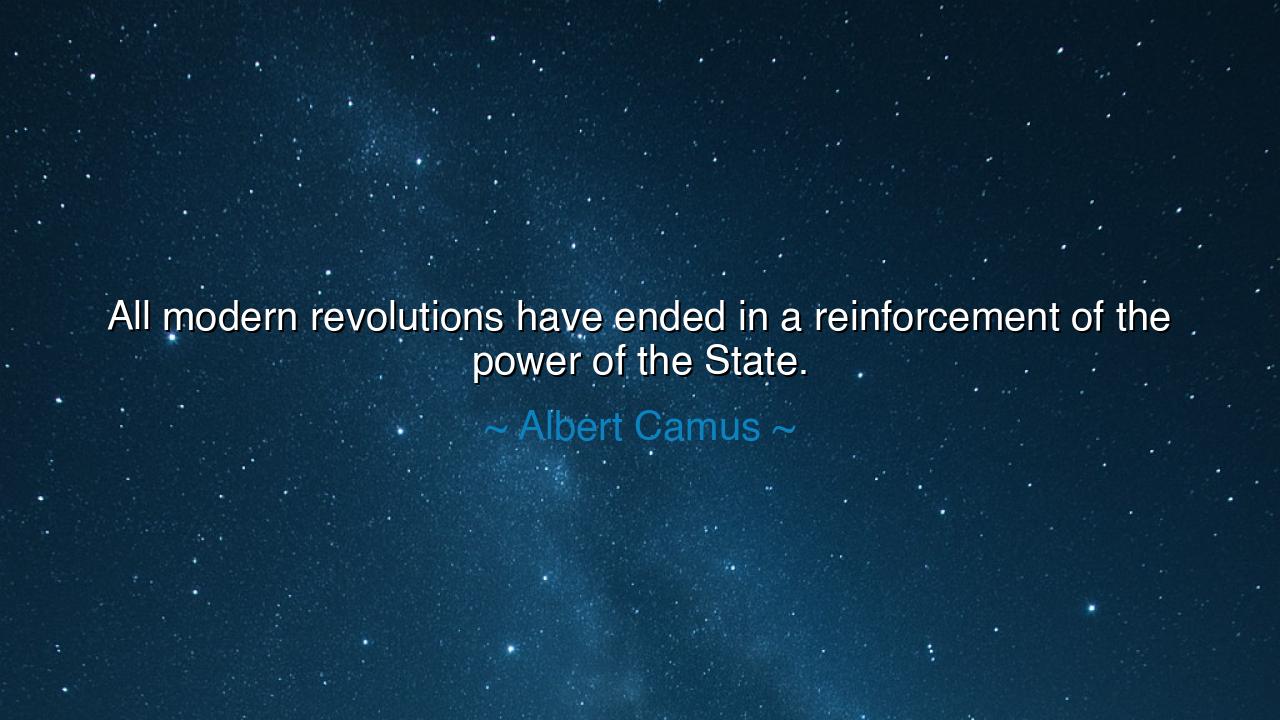
All modern revolutions have ended in a reinforcement of the






In the words of Albert Camus, “All modern revolutions have ended in a reinforcement of the power of the State,” we hear a lament carved out of history’s bitter cycles. The revolution, born in fire and promise, often begins with cries for freedom, for justice, for the breaking of chains. Yet Camus, with the clarity of one who had witnessed tyranny in many forms, declares that such upheavals rarely liberate. Instead, they forge new structures of command, where the State, once challenged, emerges even stronger, clothed in fresh robes of authority.
The meaning is sharp and sorrowful: men rise to cast down kings, only to raise new masters. The power of the State, instead of dissolving into the hands of the people, gathers more tightly, clothed in new language but wielding the same instruments of control. In this way, revolutions betray themselves, trading one form of oppression for another. What begins in hope often ends in hierarchy, as if the human spirit cannot escape its hunger to be ruled.
History confirms his judgment. The French Revolution promised liberty, equality, fraternity, yet it descended into terror, and from its ashes rose Napoleon, an emperor crowned in the name of the people. The Russian Revolution cried for workers and peasants, but delivered instead the iron grip of Stalin. In both cases, the cry for freedom was answered not with liberty, but with an even mightier State, cloaked in ideology but wielding absolute command.
Camus’s wisdom is born of skepticism, but not despair. His words remind us to be vigilant: that true liberation cannot be handed down from a throne or dictated by committees. If the people do not guard their own freedom with constant vigilance, then revolutions become but a turning of the wheel, where power changes hands but never changes form. The State, like a beast, feeds upon upheaval to make itself stronger.
So let this lesson endure: beware the illusion that revolution alone can bring freedom. Without justice, without humility, without the protection of individual dignity, even the most radiant revolt becomes the seed of new tyranny. Camus teaches us that to break the cycle, one must not only overthrow rulers, but also restrain the State itself, lest the palm of liberty be forever exchanged for the fist of power.






NTNguyen Hien Nhi Trinh
Camus’ assertion about revolutions leading to stronger States speaks to a pessimistic view of political upheaval. Does this suggest that revolutions are futile in achieving true freedom? Is the drive for control so inherent in human nature that every revolution eventually leads to more state power? What lessons can we learn from this pattern, and can we ever envision a revolution that leads to decentralization rather than centralization?
HNHuy Nguyen
Camus' comment about revolutions ultimately empowering the State raises important questions about the nature of political change. Are revolutions inherently doomed to reinforce centralized power, or can they lead to a different kind of governance? Does this quote point to the failure of revolutions to address systemic issues or to the inability of societies to create lasting alternatives to centralized authority?
TTam
Camus’ observation about modern revolutions strengthening the State instead of dismantling it brings to light a critical flaw in revolutionary movements. Why does it seem like revolutions end up reinforcing existing power structures? Is it the inherent nature of power that leads to this, or is it the inability of revolutionaries to break free from the systems they oppose? Can true freedom ever be achieved through revolutions, or do we simply shift the power from one entity to another?
PLKien Phong Luu
Albert Camus’ statement about revolutions reinforcing the power of the State challenges the idea that revolutions lead to true freedom. If every revolution results in more power for the State, is true change even possible? Are we simply trading one form of control for another? Does this suggest that the system itself is so ingrained that it resists genuine transformation, no matter how many times it is challenged?